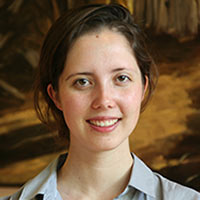
Margit Bowler '11
Fulbright U.S. Student Program
I majored in linguistics at Reed. I will travel to Australia in 2011-2012 under a Fulbright grant for my project "Quantification in the Non-Configurational Languages of Australia." I'm going to be studying under Dr. Jane Simpson at the Australian National University in Canberra. While in Australia, I'll be taking classes at ANU on Australian Aboriginal linguistics, field methods, and Australian Aboriginal development, policy, and history.
My project will focus primarily on Warlpiri, an endangered Australian Aboriginal language spoken by 3,000 people in the Northern Territory. With the support of a Fulbright, I plan to undertake fieldwork in the Northern Territory to collect data on how quantifiers (words like "each," "every," and "all") work in Warlpiri. My Fulbright year will give me firsthand experience in doing linguistic fieldwork and in working with speakers of endangered languages such as Warlpiri. I'm incredibly excited for this opportunity!
On November 15, 2012, Margit wrote:
I was based at the Australian National University in Canberra for eight months, and then I spent five months in a remote Warlpiri community in central Australia called Yuendumu. If I were to do my Fulbright over again, I would have gone straight to Yuendumu. I had a great time attending linguistics courses in Australia (which are a bit different both theoretically and methodologically from courses here in the US), and networking with the Australian linguists at ANU, but I feel like my fieldwork in Yuendumu was one of the most intellectually stimulating times of my life. I learned something new every day I was there. I kept a photo-blog while I was in Yuendumu, which you can feel free to share with anyone who might be interested: https://redcentre.tumblr.com/
I presented my Warlpiri research at a linguistics conference in New Zealand in June, and I'm going to be giving two more talks on Warlpiri here at UCLA in December and January. I also accepted an offer to write a book chapter on Warlpiri morphology-- which was not the topic of my Fulbright project, but is something that I got interested in while I was there. That should be published sometime in 2013. I'm currently writing two grant applications to try to get back to central Australia for more long-term fieldwork while in grad school; I'm applying for both a NSF graduate research fellowship and a Ford Foundation fellowship.
I'm incredibly grateful for my Fulbright experience! Having my own data to work with as a first-year in grad school has been a real privilege. I definitely got great linguistic training while at Reed, but having to put it all in practice while doing fieldwork on my own was incredibly challenging, humbling, and fun. I wouldn't trade it for anything.
If any Reedie applicants are interested in going to Australia, working on linguistics, or are just looking for advice about the Fulbright application process, I would be happy to be put in touch with them through email. Talking to past Reed Fulbright recipients (Margie Nicholson) really helped motivate me while applying.
Fulbright contributed to my global citizenship in lots of ways: first, by giving me the opportunity to network with other scholars (past and present), all over the world. I have been in touch with Fulbright alumni here in Los Angeles who have in turn put me in touch with their relatives/friends working in bilingual education programs, which is one possible career aspiration that I have. Fulbright also opened my eyes to the reality of linguistic and cultural loss all over the world, and how those two things go hand-in-hand. I'd previously spent time on Indian reservations here in the US and had seen the measures being taken by tribes to preserve their languages/cultures, so it was very interesting to see many of the same challenges being faced by Aboriginal Australians. I think a lot of parallels can be drawn between linguistic/cultural loss within Aboriginal Australian and Native American groups, and it makes me wonder if approaches taken to combat that on one continent could inform maintenance efforts on the other.
Previous profile: Kerstin Rosero '11 | Next profile: Colin Chapman '11